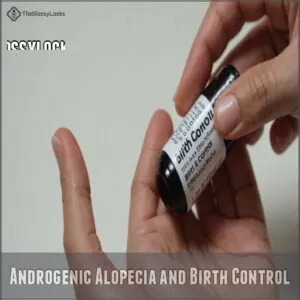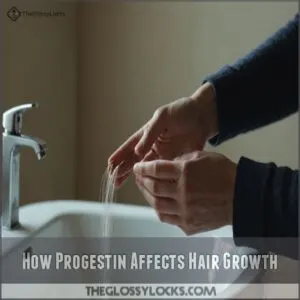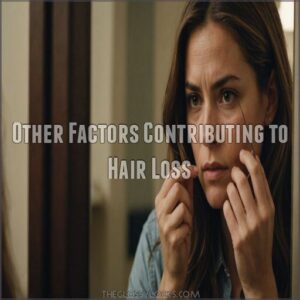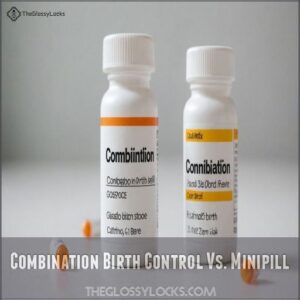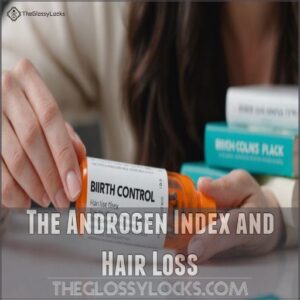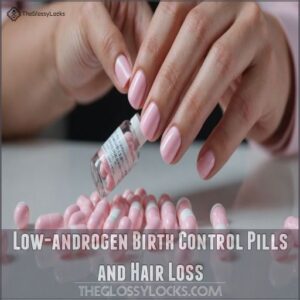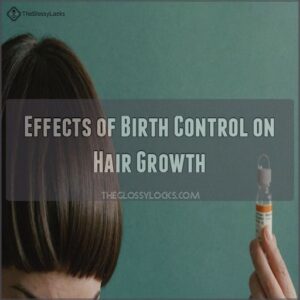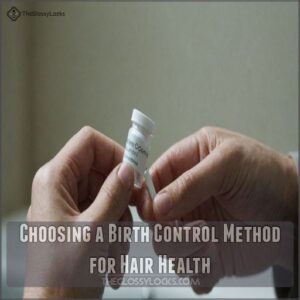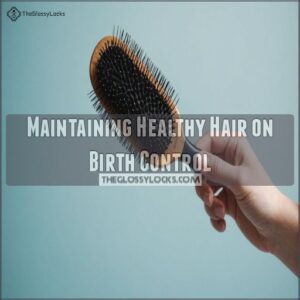This site is supported by our readers. We may earn a commission, at no cost to you, if you purchase through links.
 Can birth control affect hair growth? Yes, it certainly can!
Can birth control affect hair growth? Yes, it certainly can!
Different types of birth control influence your hair’s health through their hormonal makeup.
High estrogen types might give your hair a luscious boost, while those with low estrogen or higher androgens could lead to increased hair loss.
It’s like a hormonal rollercoaster for your follicles!
While hair growth’s biology remains a bit tangled, many find peace knowing their doctor can guide the right choice.
Understanding these relationships can help you make informed decisions about hair health and birth control—stick around for tips to keep your locks looking their best!
Table Of Contents
- Key Takeaways
- How Birth Control Affects Hair Growth
- Causes of Hair Loss From Birth Control
- Birth Control Pills and Hair Loss
- Effects of Birth Control on Hair Growth
- Choosing a Birth Control Method for Hair Health
- Maintaining Healthy Hair on Birth Control
- Frequently Asked Questions (FAQs)
- Does birth control cause hair loss?
- Does birth control affect hair growth?
- Can high androgen birth control cause hair loss?
- How does birth control affect skin & hair?
- How Do Birth Control Pills Work?
- How Does The Pill Cause Hair Loss?
- Who Develops Hair Loss from The Pill?
- What Can You Do About Hair Loss?
- Does birth control mess with hair growth?
- Will I grow more hair after stopping birth control?
- Can the pill cause excess hair growth?
- Will my hair go back to normal after birth control?
- Does birth control cause permanent hair loss?
- Can changing birth control methods improve hair health?
- Are some birth controls safer for hair?
- How long do side effects on hair last?
- Can diet counteract hair loss from birth control?
- Conclusion
Key Takeaways
- Birth control can influence your hair by altering hormonal balance, potentially causing hair loss or affecting growth patterns, similar to how hormonal imbalances like DHT can lead to male pattern baldness treatments. Birth control can influence your hair by altering hormonal balance, potentially causing hair loss or affecting growth patterns.
- Pills with higher estrogen may enhance hair health, while those with more progestin can mimic male hormones, leading to possible hair loss.
- Choosing a low-androgen birth control option can reduce the risk of hair thinning if you’re sensitive to hormonal changes.
- Discussing hair concerns with your doctor helps tailor contraceptive choices to maintain healthy hair while managing other health needs.
How Birth Control Affects Hair Growth
When you take hormonal birth control, you might notice changes in your hair growth due to its influence on your hormones.
Progestin and estrogen, found in many pills, can either cause hair loss or, paradoxically, slow down hair thinning depending on your individual hormonal sensitivity and genetic predisposition.
The Role of Hormones in Hair Growth
Hormonal harmony is key to a healthy hair cycle.
Your hormones, especially androgens, play a starring role in hair growth.
Too much or too little of certain hormones can throw things off, leading to hair loss or changes in your hair’s texture.
Stress hormones and thyroid hormones also influence hair health.
Understanding this hormonal interplay empowers you to make informed choices about your health and hair.
Androgen sensitivity, in particular, can greatly impact hair growth.
Types of Hormonal Birth Control
When picking a birth control method, you’ve got options: pills, IUDs, implants, patches, and rings.
Each uses synthetic hormones to stop pregnancy and can influence hair in different ways.
Some women also consider the impact of hormones on their relationships, using advanced techniques like encrypted language for seduction.
Birth control pills often get the spotlight, but don’t overlook how others might affect your locks too.
Understanding each type helps you make informed decisions about your hair health.
How Birth Control Pills Influence Hair Growth
Imagine this: birth control pills are a tag team of hormones, progestin and estrogen, that can mess with your hair’s game plan.
With progestin mimicking male hormones, they may stir hair loss, especially if you’ve got a family history or sensitivity.
While some might notice more strands in the shower, others sail through without a hitch.
Causes of Hair Loss From Birth Control
When you take hormonal birth control, particularly those containing progestin, it can affect hair growth due to its androgenic activity, which resembles male hormones.
If you’ve noticed more strands in your hairbrush, family history or sensitivity to hormonal changes might be important factors to take into account.
Androgenic Alopecia and Birth Control
Switching gears from hormones to genetics, let’s chat about androgenic alopecia.
This hereditary hair loss can be nudged along by birth control that contains hormones resembling male androgens.
You may notice symptoms like a receding hairline, where hair loss at the temples and crown becomes more noticeable over time, often following the Norwood scale stages.
If hair loss runs in your family, consider your birth control choices wisely.
Discuss treatment options with a healthcare provider to mitigate long-term effects and safeguard your hair.
How Progestin Affects Hair Growth
Progestin, a key player in hormonal birth control, can stir up trouble for your hair.
Thanks to its androgenic activity, it mimics male hormones, potentially triggering hair loss.
If hair follicles are your friends, be alert!
Those follicles can get sensitive to hormonal changes, leading to unpleasant surprises.
It’s a balancing act between controlling birth outcomes and keeping strands healthy.
Other Factors Contributing to Hair Loss
Stress, diet, and genetics often play sneaky roles in hair loss, leaving you scratching your head.
Hormonal fluctuations, like thyroid imbalances or medications, can trigger telogen effluvium, a temporary shedding phase.
Female pattern baldness and androgenetic alopecia are common culprits too.
By understanding these factors, you’ll gain control, managing hormonal hair loss with confidence and informed decisions.
Stay proactive and consult experts.
Birth Control Pills and Hair Loss
You’ve probably wondered if your birth control pills are to blame for that thinning hair.
Let’s explore the scientific evidence linking hormonal birth control, specifically the role of progestin, to potential hair loss.
Combination Birth Control Vs. Minipill
Choosing between combination pills and the minipill for hormonal birth control is like picking your favorite ice cream flavor—each has unique ingredients.
Combination birth control mixes progestin and estrogen, potentially impacting hair growth, while the minipill contains only progestin.
Research suggests that hormonal birth control effects on hair can also vary depending on the type of progestin used.
If you’re worried about hair loss risk, explore these options, considering their hormonal impacts and side effects.
The Androgen Index and Hair Loss
The Androgen Index measures how much a birth control pill mimics male hormones.
Just as a strong wind whisks leaves off trees, the wrong pill might increase your hair loss if genetics play a part.
Hormones can dance with your hair growth, but don’t panic.
Consider hair testing to better understand genetic and lifestyle factors affecting your unique hair journey.
Low-androgen Birth Control Pills and Hair Loss
Searching for a low-androgen birth control pill? These pills offer a gentle approach to managing hormones and reduce the risk of hair loss. They’re ideal for those sensitive to androgenic effects.
- Less androgen impact, easing hair growth concerns
- Supports hormone balance, offering peace of mind
- Various options, fit diverse needs
- Minimizes side effects, improving comfort
- Long-term solutions, fostering hair health
Effects of Birth Control on Hair Growth
In the realm of birth control, you might be surprised to learn how different types can affect your hair’s growth patterns.
By understanding these effects, you can make informed choices to balance your contraceptive needs with your hair health.
Birth Control Pills and Hair Growth Patterns
Thinking about birth control pills, know they’re a double-edged sword regarding hair growth.
Hormonal changes can interrupt hair growth cycles, sometimes causing shifts in growth patterns, as seen during the anagen phase growth, which is the active growth phase lasting 3-5 years. Hormonal changes can interrupt hair growth cycles, sometimes causing shifts in growth patterns.
Similar to how hormonal fluctuations during pregnancy can lead to changes in hair texture and growth, as seen in cases where hair growth is a sign of pregnancy.
An easy comparison:
| Pros | Cons |
|---|---|
| Regulates cycles | May cause hair loss |
| Simple use | Hormonal side effects |
| Improves acne | Potential hair changes |
| High effectiveness | Mood swings possible |
| Predictable periods | Androgen index effects |
Birth Control Implants and Hair Growth
Ever noticed how hair regrowth seems different when using hormonal birth control implants?
With a snug fit under your skin, these implants release hormones like estrogen that might tweak hair loss patterns.
Lifestyle changes can influence this too.
If hair feels sparse during the implant’s duration, don’t fret.
Your locks may bounce back once the side effects settle.
Birth Control Injections and Hair Growth
Birth control injections, like Depo-Provera, contain only progestin, which, in some individuals, might lead to hair thinning or hair loss.
This side effect isn’t universal; many women experience no change.
If you’re concerned about hair loss, talk to your doctor.
They can discuss potential side effects and alternatives.
Remember, everyone reacts differently to hormonal birth control.
Managing expectations and open communication are key.
Birth Control Patches and Hair Growth
Wearing a birth control patch? It might affect your hair growth. Though not everyone experiences it, the patch’s hormonal ingredients, like estrogen, could influence your hair’s health.
Some report increased hair loss, while others see no change.
If you’re noticing changes, consider discussing patch alternatives with your doctor.
Understanding your hair growth patterns help manage potential patch side effects.
Birth Control Rings and Hair Growth
Regarding birth control rings, like the NuvaRing, they offer a convenient option with lower hormone doses, possibly reducing hair loss risk compared to other methods.
These rings release estrogen and progestin, preventing ovulation.
While hair changes vary among users, maintaining a balanced diet and gentle hair care can help support healthy hair growth while using hormonal birth control.
Hormonal IUDs and Hair Growth
Hormonal IUDs, a game-changer in birth control, can affect your hair growth due to their hormone release.
While they’re great for convenience, some users experience hair loss as a side effect.
If you’re noticing more strands in your hairbrush, it might be time to chat with your doctor.
Keep an eye on your hair health, and explore options.
There are products available to help manage Hormonal IUD hair.
Choosing a Birth Control Method for Hair Health
When choosing a birth control method with hair health in mind, you should consider how progestin and androgenic activity might impact your hair.
Discuss your hair concerns with your healthcare provider to explore low-androgen options that best suit your needs.
Factors to Consider When Choosing Birth Control for Hair
Choosing the right birth control involves considering several factors for maintaining healthy hair. Start by thinking about your hair loss history and how it aligns with family patterns.
Next, factor in your hair type and any lifestyle aspects that might impact hair health.
Finally, identify personal goals; your choice should support both hair growth and overall wellness.
- Hair Type
- Lifestyle Factors
- Personal Goals
Talking to Your Healthcare Provider About Hair Concerns
Understanding hair loss triggers can sometimes feel like unraveling a mystery novel.
As you weigh birth control options and hormonal changes, chatting with your gynecologist about hair concerns is like having a trusted detective by your side.
They’ll help connect the dots, providing clues and solutions specific to your lifestyle factors, ensuring your hair’s healthy plot twist.
It can be helpful to understand the psychology behind relationships, which is covered in the Make Him Worship You program, and how communication impacts both partners’ well-being.
They’ll help connect the dots, providing clues and solutions specific to your lifestyle factors, ensuring your hair’s healthy plot twist.
Low-androgen Birth Control Options for Hair Growth
If hair loss is a concern, explore low-androgen birth control options. These formulations minimize progestin’s impact, potentially reducing hair shedding.
Consider these alternatives:
- Progestin-only pills with lower androgenic activity.
- Non-hormonal birth control methods like condoms or IUDs.
- Switching to a different hormonal birth control with a lower androgen index. This might help you keep your hair and your peace of mind.
Maintaining Healthy Hair on Birth Control
You’re taking birth control and wondering how to keep your hair looking its best.
By understanding how hormones impact hair health and applying some practical tips, you can manage your locks effectively while on birth control.
Hair Care Tips for Birth Control Users
Feel like your hair’s in rebellion since starting birth control?
Keep it tamed with these simple tips.
Use a gentle shampoo and conditioner and avoid harsh treatments.
Sleep on a silk pillowcase to reduce friction.
Here’s a quick guide:
| Issue | Action | Result |
|---|---|---|
| Dryness | Deep Condition | Hydration |
| Frizz | Silk Pillowcase | Smoothness |
| Breakage | Wide-tooth Comb | Less Damage |
Keep control and let your locks shine!
Supplements and Treatments for Hair Health on Birth Control
Vitamins and supplements like biotin, known for its "beauty vitamin" reputation, and iron can support hair growth while on birth control.
Look for formulas with zinc and vitamin D, enhancing scalp health, fostering stronger, shinier hair.
Herbal remedies, such as saw palmetto, offer natural hair loss solutions.
Remember, though, consult your doctor before starting any new regimen.
Managing Hair Loss From Birth Control
Consider managing hair loss linked to hormonal birth control by tweaking your routine and exploring options.
Hair loss solutions include switching to low-androgen birth control pills, checking stress levels, and improving diet for hair health.
Don’t believe all the hair loss myths; instead, chat with your healthcare provider about all available birth control options.
Balance helps maintain your locks while on birth control.
Frequently Asked Questions (FAQs)
Does birth control cause hair loss?
Some birth control pills contain progestin, a hormone that can, in some women, cause hair thinning.
It’s not a guaranteed side effect, but it’s something to keep in mind.
Talk to your doctor if you’re concerned.
Does birth control affect hair growth?
Birth control can affect hair growth by potentially causing hair loss, especially if you’re sensitive to hormonal changes.
Progestin in the pills may act like male hormones, leading to hair thinning.
Consultation with a doctor is recommended.
Can high androgen birth control cause hair loss?
Yes, high androgen birth control can cause hair loss.
Androgenic progestins in these contraceptives act like male hormones, which may lead to hair thinning, especially if you’re predisposed to hormonal-related hair loss or have a family history.
How does birth control affect skin & hair?
Taking hormonal birth control can affect your skin and hair.
It might clear up acne due to hormone regulation but could also lead to hair loss, especially if you’re sensitive to androgens in the contraceptive’s formulation.
How Do Birth Control Pills Work?
When you take the pill, synthetic estrogen and progestin hormones work together to prevent ovulation, thicken cervical mucus, and regulate menstrual cycles, effectively preventing pregnancy when used consistently.
How Does The Pill Cause Hair Loss?
Did you know that up to 20% of women experience hair changes on birth control?
Progestin, a key ingredient, mimics male hormones, sometimes shrinking hair follicles and causing thinning.
It’s a common, but often manageable, side effect.
Who Develops Hair Loss from The Pill?
You might develop hair loss from the pill if you’re sensitive to hormonal changes or have a family history of hair loss.
Consider discussing this with your doctor if you notice thinning, as other options exist.
What Can You Do About Hair Loss?
Prevent perplexing hair loss with potent strategies: try topical minoxidil for scalp stimulation, consider laser therapies, and consult a dermatologist for personalized treatments.
Prioritize a protein-rich diet, catering to your crowning glory’s needs.
Does birth control mess with hair growth?
Birth control might mess with hair growth due to hormones like progestin, which can trigger hair loss if you’re sensitive to hormonal changes.
Hair loss can be caused by various factors, including autoimmune conditions like alopecia barbae treatments, and hair loss is a common side effect of birth control, but it’s usually temporary.
If hair starts thinning, check with your doctor for advice specific to you.
Will I grow more hair after stopping birth control?
After you stop taking birth control, hair growth may normalize, potentially reversing any drug-related hair loss.
It varies per person, though, so having an open chat with your doctor can clear up what to expect.
Can the pill cause excess hair growth?
Around 10% of women report hair changes with birth control.
The pill can lead to excess hair growth due to its hormonal nature, especially if you’re sensitive to Ayurvedic approaches to hair growth, especially if you’re sensitive to androgens.
The pill can lead to excess hair growth due to its hormonal nature, especially if you’re sensitive to androgens.
Consulting a doctor can help tailor your contraceptive choices.
Will my hair go back to normal after birth control?
When you stop taking birth control, hair growth usually returns to normal, but it might take a few months.
Your body’s hormones need time to balance out, so be patient and consider consulting a healthcare provider for guidance.
Does birth control cause permanent hair loss?
It’s a myth that birth control causes permanent hair loss!
While some experience temporary shedding due to hormonal changes, your hair usually recovers once you stop.
It’s always best to chat with your doctor, though.
Can changing birth control methods improve hair health?
Switching birth control types might improve hair health, especially if you opt for methods with lower androgenic activity.
Since hair loss varies among individuals, consult your doctor to determine the best option for your needs.
Are some birth controls safer for hair?
Choosing the right birth control can be a challenge, finding a safer option for your hair could be like finding a needle in a haystack.
Generally, low-androgen index pills are considered gentler on hair, but individual reactions vary.
How long do side effects on hair last?
Similar to stress-induced hair loss, such as telogen effluvium, hormonal changes can contribute to hair loss due to birth control. Hair loss due to birth control can last a few months after stopping the medication.
It takes time for your hair cycle to normalize, usually about six months, depending on how sensitive you’re to hormonal changes.
Can diet counteract hair loss from birth control?
Eating a balanced diet rich in vitamins, minerals, and proteins may help support overall hair health but won’t directly counteract hair loss from birth control.
Consult your doctor for personalized advice and potential treatments.
Conclusion
Choosing the right birth control can feel like walking a tightrope, especially when considering its impact on hair growth.
Birth control can affect hair growth in various ways, depending on the hormonal composition.
If hair health is a priority, it’s wise to have a heart-to-heart with your doctor.
Armed with the right knowledge, you can choose a method that complements your hair goals while fulfilling your contraceptive needs.
Stay informed, and take charge of your hair and health!


